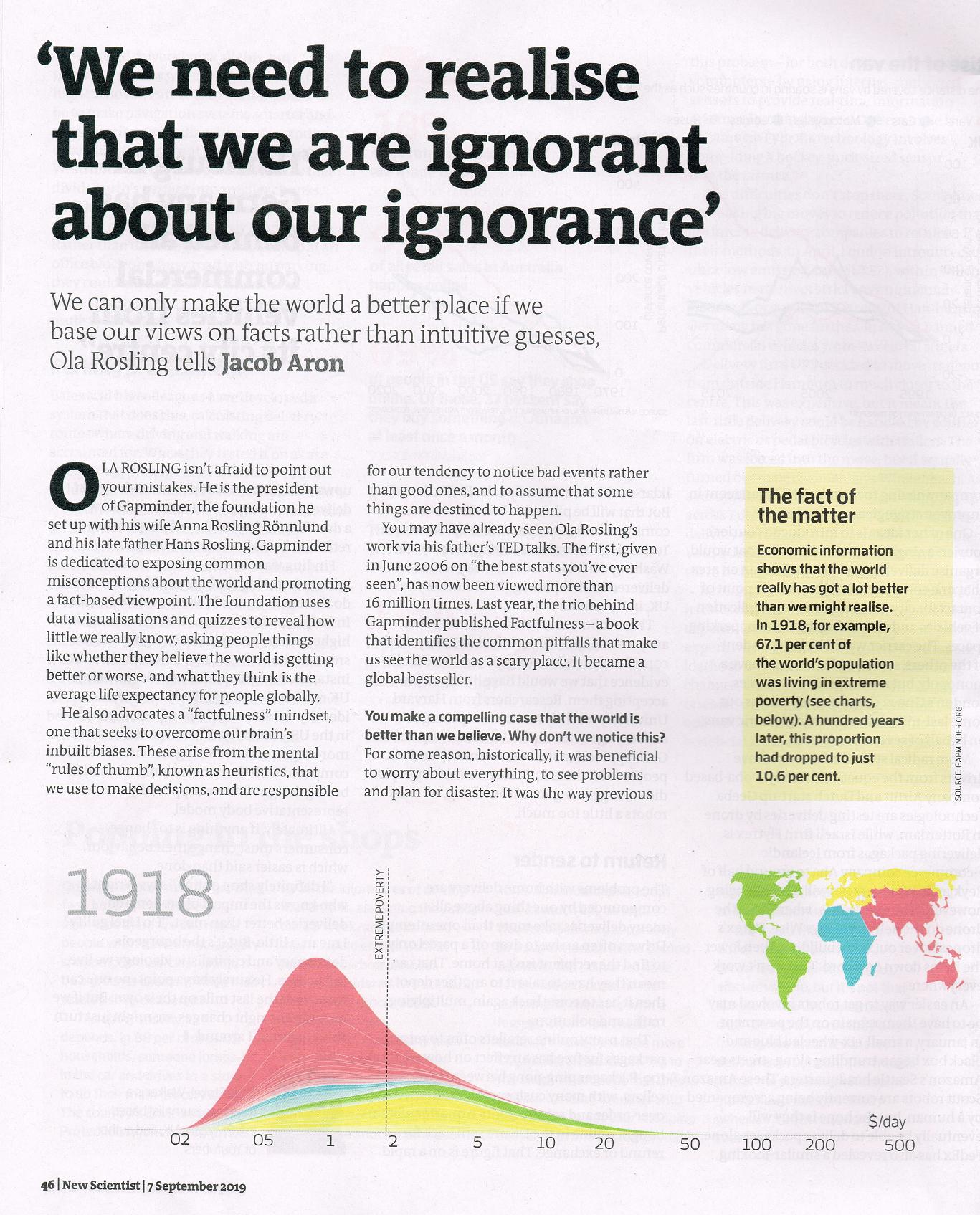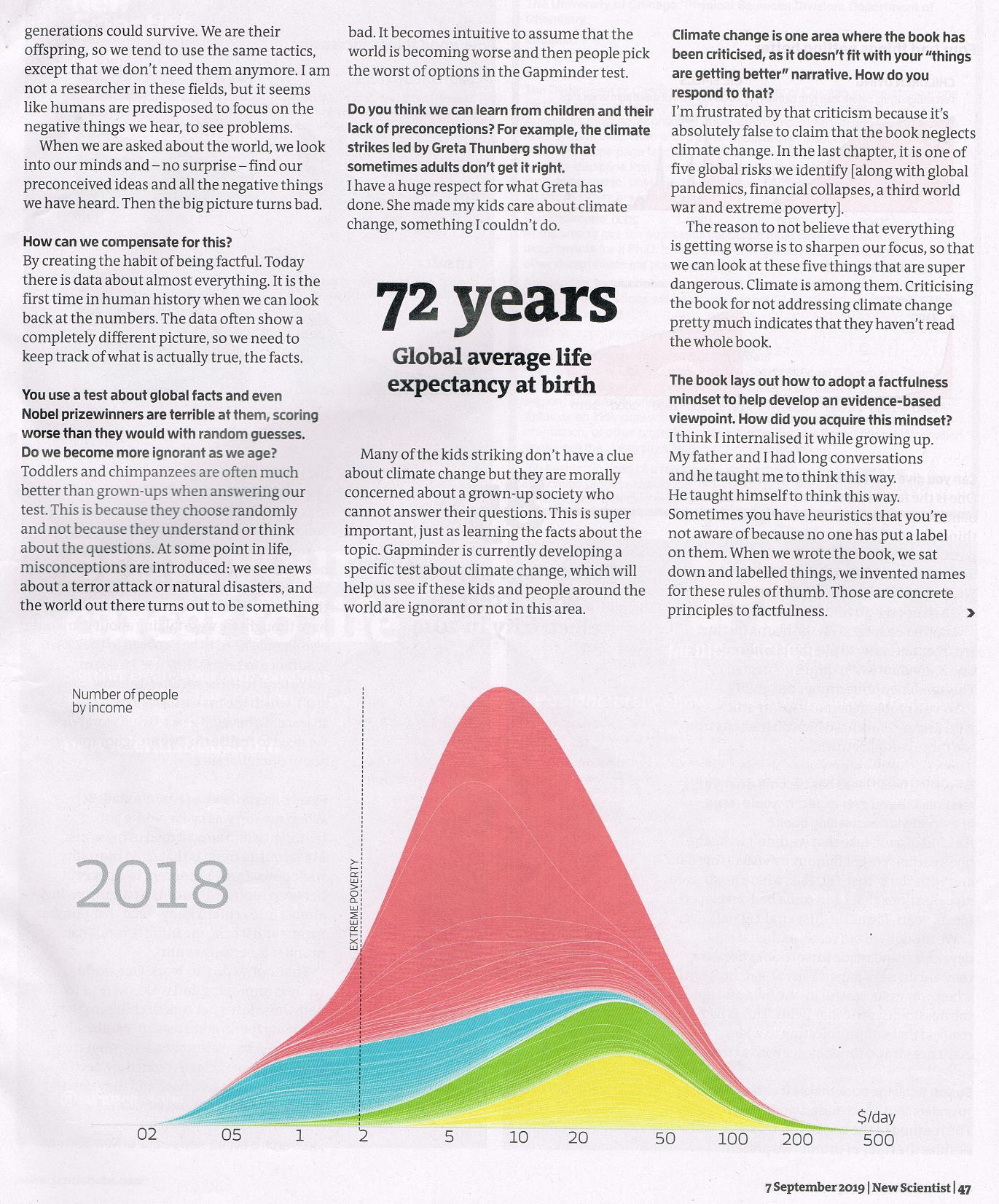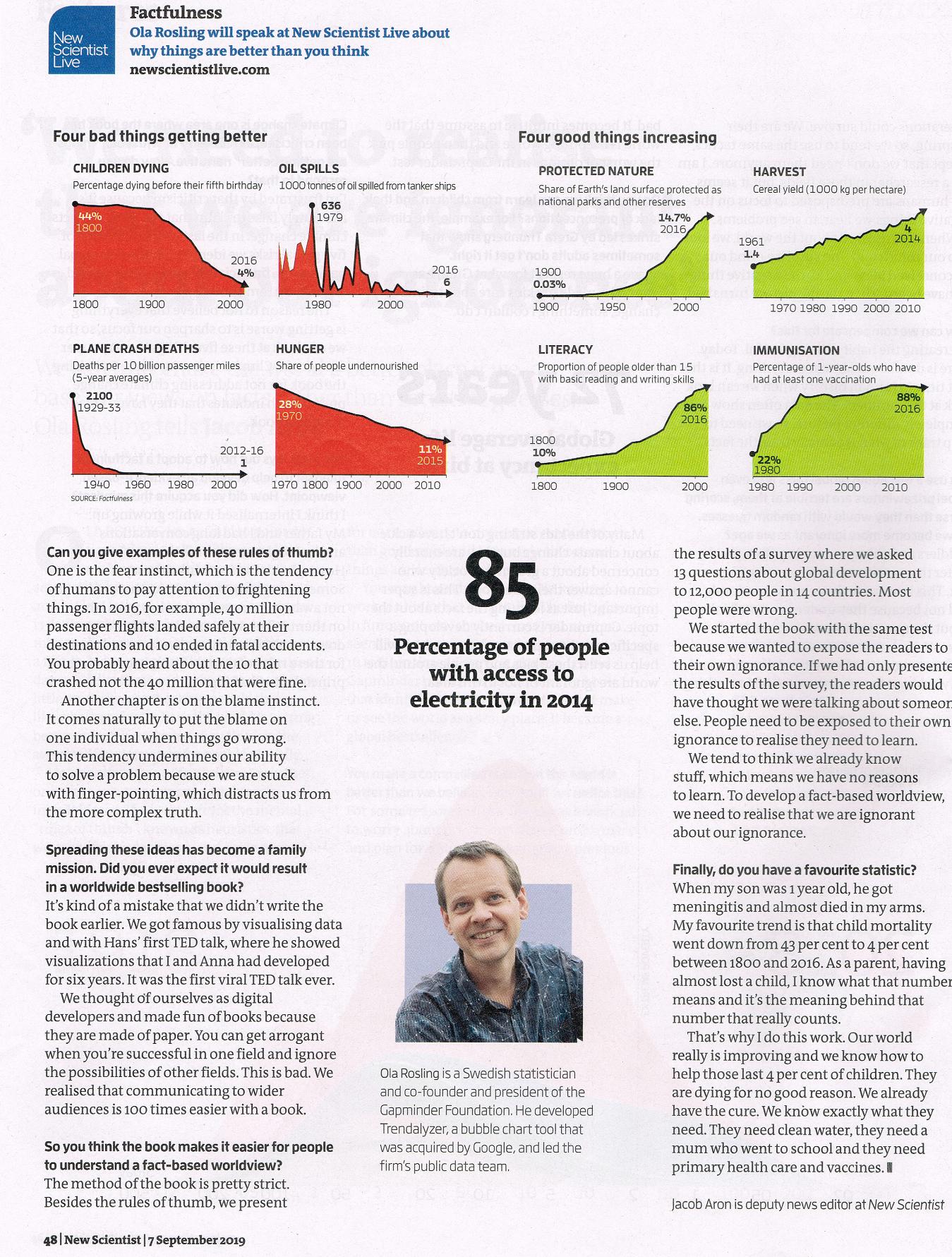Factfulness
Why Things Are Better Than You Think
Hans Rosling
More books on Politics
Almost everyone has an over-dramatic worldview. We think things are bad and getting worse. In fact, almost every measure is a bell-shaped curve. For eg, there is extreme poverty, and there are obscenely rich people. But the vast majority of the world's population is in the middle.
"Poor developing countries" no longer exist as a distinct group. Most people - 75% - live in middle income countries. Not rich, not poor. And if you add in the higher-income countries, you have 91% of humanity.
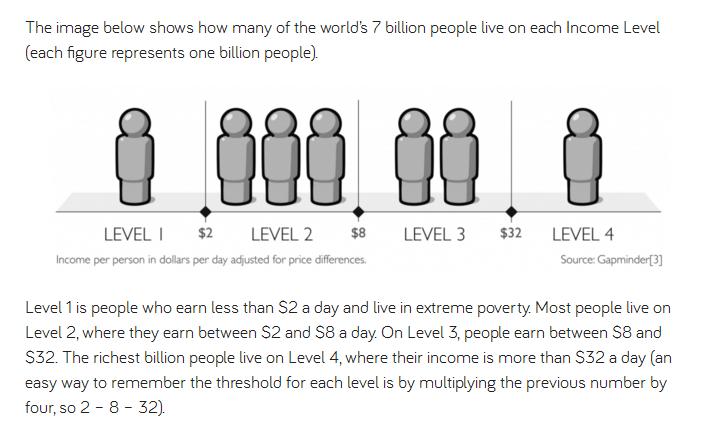
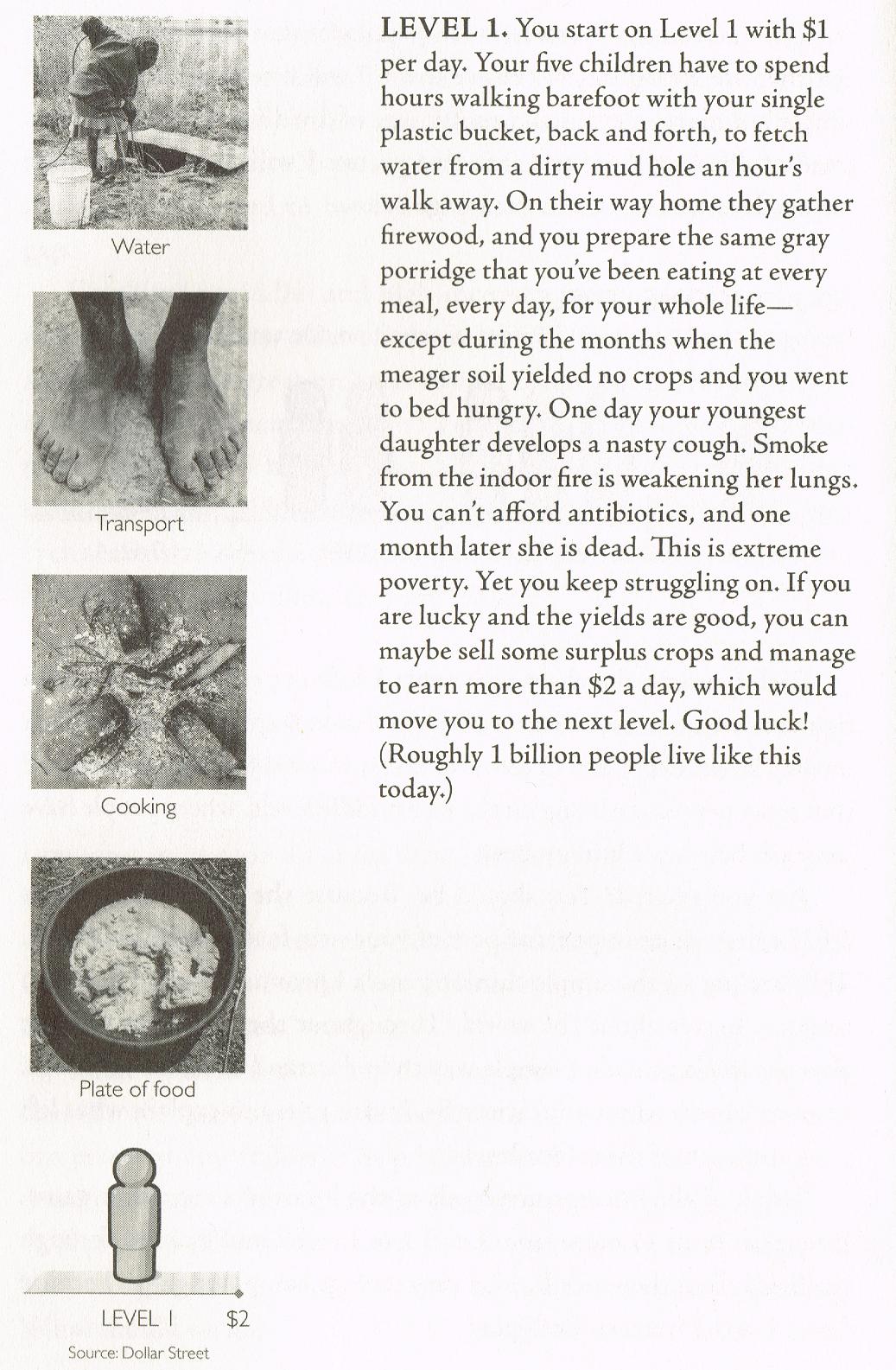
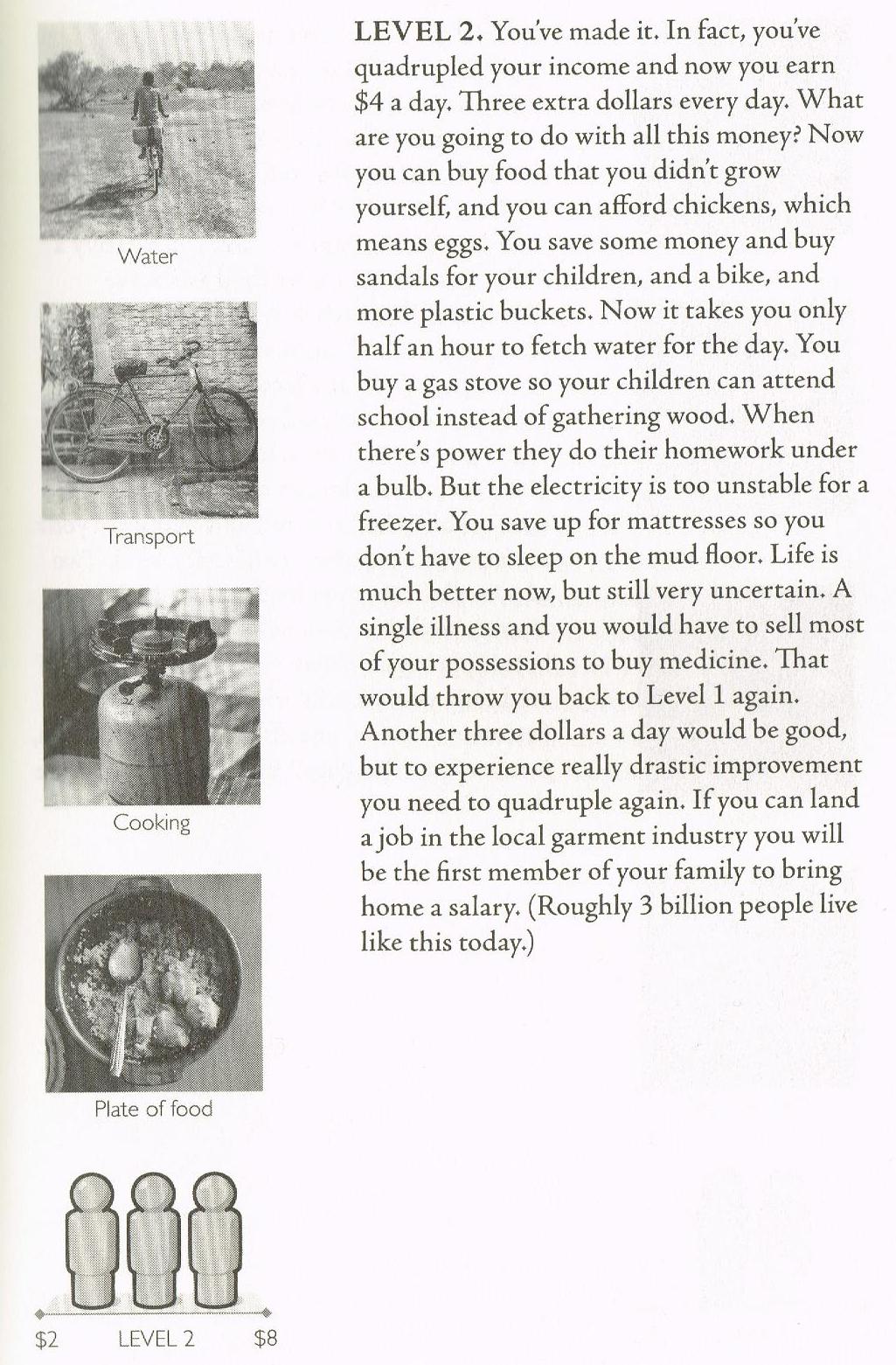
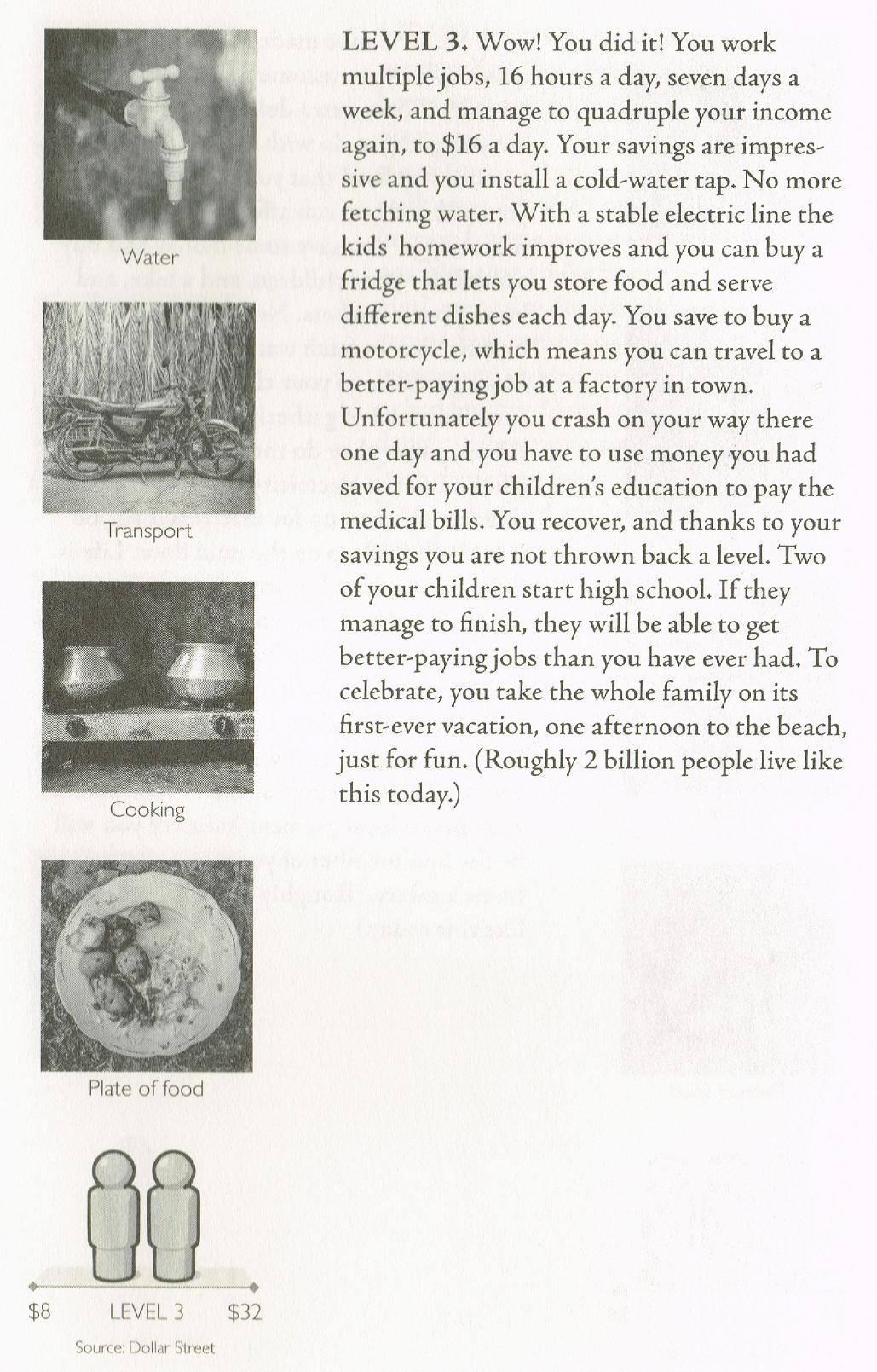
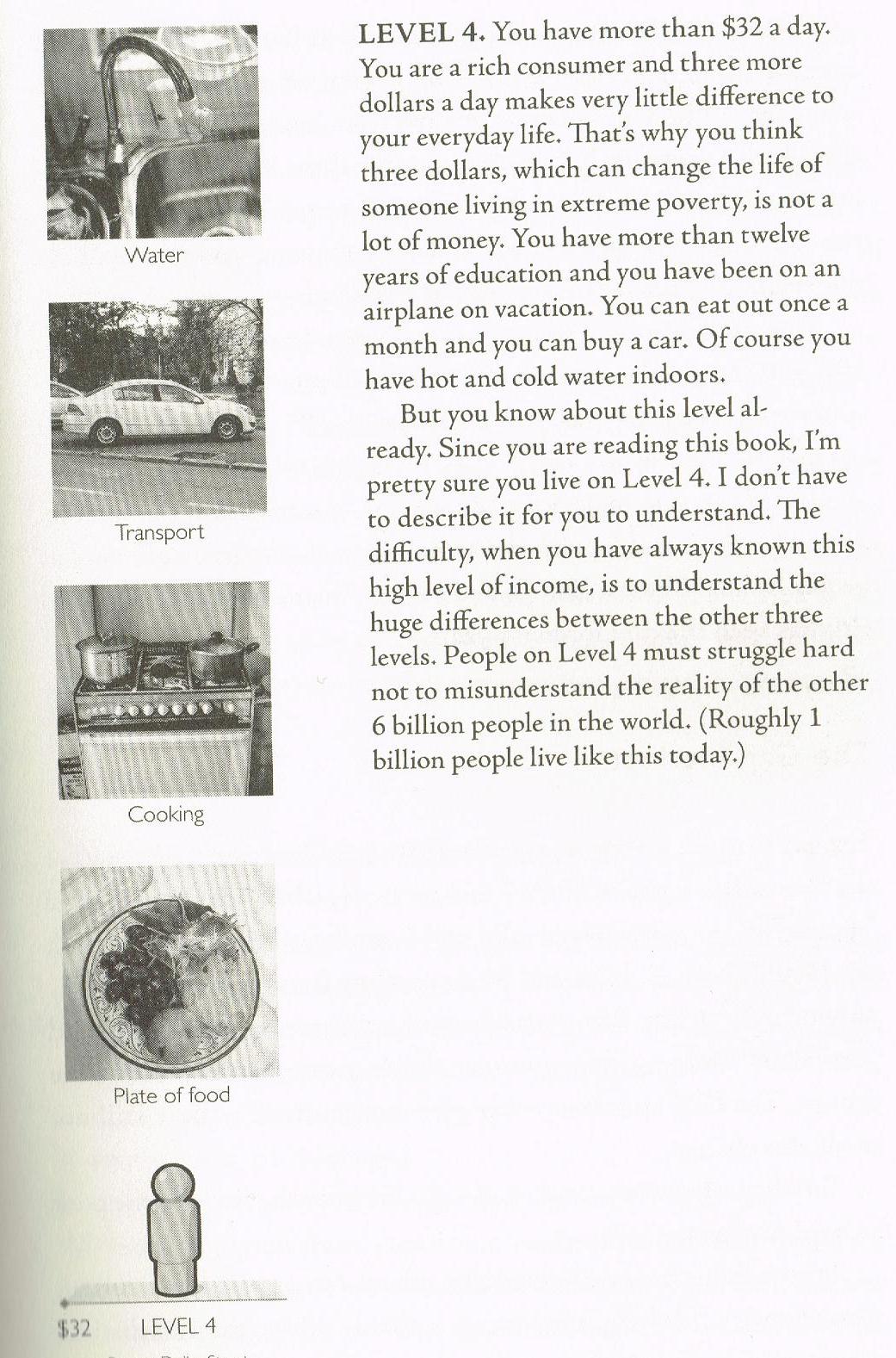
Human history started with everyone on Level 1. Right up until last 200 years, 85% of popn was still on Level 1, in extreme poverty. Today, vast majority are in Levels 2 and 3, with same sol as people in America in 1950s.
Today we have 'relative poverty'. In US people in Level 3 are classed as being below the poverty line.
Over last 20 years the proportion of people in level 4 has halved. Not only are the numbers dropping, but the rate of improvement is increasing. In 1997 both India and China had 42% of popn living in extreme poverty. By 2017, India had got that down to 12%. China down to 0.7%. The whole world has gone from 29% to 9%.
Child mortality rate takes the temperature of the whole society. There are so many things that can kill children. So if Malaysia has only 14 deaths per 1000 , that means that most families there have enough food, their sewage systems don't leak into their drinking water, they have good access to primary health care, and mothers can read and write. It's not so much the raw numbers it's what they show about the lives behind the numbers.
In 1950, 97 million children were born and 14 million of them died before first birthday (15%). In 2016 141 million children were born and 4.2 million died (3%).
Life expectancy another measure. In 1800 it was 30 everywhere. Half the children in childhood, the other half died between 50 and 70. Today the world average is 72.
Author's great-grandmother born 1863, when Sweden's average income same as Afghanistans today, right on Level 1, with most people living in extreme poverty. But today people in Afghanistan and other Level 1 countries live 30 years longer than did Swedes in 1800. This is bc basic modernizations have improved the lot of even people on Level 1. They have plastic buckets to carry water and plastic bags to carry food. They have spoap to kill germs and their children get vaccinated.
Impt to realize the progress being made. If you get (false) idea that everything is bad and getting worse, you can lose hope, and decide that nothing is worth supporting. Or you can turn radical, and look for drastic measures which are counter-productive. In fact, we just need to keep doing what we do today, accelerating that when possible.
Educating girls turns out to be one of the world's best-ever ideas. Educated mothers change societies. The workforce becomes more diverse and makes better decisions. Ed mothers decide to have fewer children, and more of them survive, and get educated. A virtuous cycle.
If we save poor children, we'll kill the planet with over-population sounds correct, but the opposite is true. Once parents see children survive, once children not needed for child labour, and once women have access to contarceptives, both men and women start dreaming about having fewer, better educated children - bc that is their path out of extreme poverty.
The only proven method of curbing popn growth is to give people better lives, including ed and contraception.
Number of deaths from natural disasters is 25% of what it was in 1900. Better education and public TV means people are better prepared for floods or storms. Building regs mean fewer buildings collapse. UN co-ordinates relief efforts.
Paying attention to visible individuals rather than to the numbers can lead us to spend resources on a fraction of the problem, and therefore help many less people. Resources are finite, and the compassionate thing is to work out how to do the most good with what you have.
Common sight in Level 2 and 3 countries are half-built houses. Looks like a problem, but in fact you're looking at a solution. They don't have access to a bank to save or to get a loan. So they buy bricks. And so they won't get stolen, they add them to their house. May take 10 or 15 years to add another storey or extra rooms out the back, but they get there.
Common belief that Africa is destined to always be a basket case. Yet, over the last 60 years African countries went from being colonies to being independent countries. And in that time they have expanded their education, electricity, water and sanitation infrastructures at the same steady speed that Eiropean countries achieved when they went through their own miracles. And each of the 50 countries south of the Sahara reduced child mortality faster than Sweden did (author is a Swede).
50 years ago, India, China and South Korea were all way behind where African countries are today. And people then believed those Asian countries were permanently doomed to poverty ("They will never be able to feed 4 billion people').
Investors ignore the rapid progress in Africa, and the resulting expansion of middle classes. And they think of Western world's eco stagnation this century as being a temporary blip. This is a problem for you and me, bc most retirement funds are invested in stagnation Western economies, whereas the growth is all happening in Africa.
We resist complex ideas. We much prefer simple idea, single causes and explanations, and simple solutions. For example, the single idea of the free market leads to the simple explanation that all problems have a single cause - govt interference - and so the solution to the problems must be to remove taxes and regulations. Or the simple idea that all problems are casued by inequality, and so the solution is redistribution of resources.
Great knowledge can interfere with an expert's ability to see what actually works. Their knowledge and skills are greatfor solving some problems, but none of them will solve all problems. Maths experts get fixated on stats. Surgeons promote treatments when prevention would be better.
In 1950's WHO came up with an idea to help India by eradicating Tb. They sent little vans around the countryside to xray everyone and then send the sufferers off to hospital. But the people got very angry and the program failed. Bc they had all these urgent medical problems, and here was a bus with nurses and doctors. But instead of treating their broken bones or helping a woman in childbirth, they wanted to xray everyone for a disease they'd hardly heard of. Led to the insight that instead of trying to eradicate one single disease they shd concentrate on gradually improving everyone's health care.
BigPharma conc their efforts on producing blockbuster lefe-extending drugs for rich Westerners. Author suggests that instead they shd cjanfe their business model and make existing drugs cheap enough for the billions in Level 2 and 3.
Best use of money to save women with birthing problems is not more hospitals or nurses, it is actually more ambulances so that distant women can get to existing facilities. Similarly, what education needs most is nor more schools or teachers, but electricity so that students can study at night.
US is the sickest of all the rich countries. US spends twice as much on health care as other Level 4 countries - $9400 a head vs $3600 - and for that money its citizens have av life expectancy 3 years shorter.
And it's not rocket science to figure out why - it's the absence of basic public health insurance. Rish, insured patients get more tests and treatment than they need; poor patients cannot afford even simple inexpensive treatments and die earlier than they need to.
When things go wrong, look for causes rather than villains. Accept that things go wrong even without people intending them to. Look for systems, not heroes. If someone claims credit, check whether it might have been due to the hundreds of anons doing their little chunks of the job.
(Fast Company)
Rosling introduces the book with the news, talking about the horrors of the world - increasing inequality, disasters, corruption, the environmental catastrophes, and such. He calls this the overdramatic worldview, describing it as stressful and misleading. He likens our instincts and susceptibility to drama to instincts that helped our ancestors survive as small groups of hunters and gatherers. For example, take our cravings for carbohydrates:
Rosling also highlights the role of media, writing, "Journalists know this. They set up their narratives as conflicts between two opposing people, views, or groups. They prefer stories of extreme poverty and billionaires to stories about the vast majority of people slowly dragging themselves toward better lives. Journalists are storytellers. So are people who produce documentaries and movies."
WHY MEDIA FEEDS OUR INSTINCTS
Deliberate or not, journalists are of course just giving us what they're incentivized to - what we want and choose to pay for. As David Streitfeld paraphrases Ev Williams,"Say you're driving down the road and see a car crash. Of course, you look. Everyone looks. The internet interprets behavior like this to mean everyone is asking for car crashes, so it tries to supply them."
"The more facts you accumulate, the closer you come to whatever truth there is," biographer Robert Caro writes in Working. And finding facts - through reading documents or through interviewing and re-interviewing - can't be rushed; it takes time. Truth takes time. Facts need to be verified and compared with alternate possibilities, after all.
On their own, facts aren't perfect either. They aren't bricks of hard truth. Rather, all facts by necessity involve the omission of context - one fact is actually interconnected with many others - and trust in the source and method. But most importantly, adding up facts and making sense of them together gets us closer to the truth.
For example, there are criticisms of Rosling's methods and framing of the data, as well as his omissions. There's also Rosling's ideology and his method of persuasion. This is the slow, agonizing, process of getting closer to the truth. It's fitting that the organization behind the book, Gapminder, covers some of the errors printed in the first edition of Factfulness. Declaring something a fact - unalterable, unimprovable, completely truthful - is unscientific and wouldn't be in the spirit of factfulness.
Despite some inevitable inaccuracies, that doesn't mean the pursuit or virtue of facts is futile or unworthy. As Isaac Asimov writes to one of his students in The Relativity of Wrong, "When people thought the earth was flat, they were wrong. When people thought the earth was spherical, they were wrong. But if you think that thinking the earth is spherical is just as wrong as thinking the earth is flat, then your view is wronger than both of them put together."
Over time, facts enable us to become less wrong about our understanding of ourselves and our world. And facts are the closest thing we have to understanding truth. "When we have a fact-based worldview," Hans Rosling writes in Factfulness, "we can see that the world is not as bad as it seems - and we can see what we have to do to keep making it better." We can completely agree with Rosling's ideal philosophy, the pursuit and rigorous evaluation of facts and open-mindedness, even if not the conclusions he has come to.
Bill Gates review: Gates Notes
New Scientist article
Today we have 'relative poverty'. In US people in Level 3 are classed as being below the poverty line.
Over last 20 years the proportion of people in level 4 has halved. Not only are the numbers dropping, but the rate of improvement is increasing. In 1997 both India and China had 42% of popn living in extreme poverty. By 2017, India had got that down to 12%. China down to 0.7%. The whole world has gone from 29% to 9%.
Child mortality rate takes the temperature of the whole society. There are so many things that can kill children. So if Malaysia has only 14 deaths per 1000 , that means that most families there have enough food, their sewage systems don't leak into their drinking water, they have good access to primary health care, and mothers can read and write. It's not so much the raw numbers it's what they show about the lives behind the numbers.
In 1950, 97 million children were born and 14 million of them died before first birthday (15%). In 2016 141 million children were born and 4.2 million died (3%).
Life expectancy another measure. In 1800 it was 30 everywhere. Half the children in childhood, the other half died between 50 and 70. Today the world average is 72.
Author's great-grandmother born 1863, when Sweden's average income same as Afghanistans today, right on Level 1, with most people living in extreme poverty. But today people in Afghanistan and other Level 1 countries live 30 years longer than did Swedes in 1800. This is bc basic modernizations have improved the lot of even people on Level 1. They have plastic buckets to carry water and plastic bags to carry food. They have spoap to kill germs and their children get vaccinated.
Impt to realize the progress being made. If you get (false) idea that everything is bad and getting worse, you can lose hope, and decide that nothing is worth supporting. Or you can turn radical, and look for drastic measures which are counter-productive. In fact, we just need to keep doing what we do today, accelerating that when possible.
Educating girls turns out to be one of the world's best-ever ideas. Educated mothers change societies. The workforce becomes more diverse and makes better decisions. Ed mothers decide to have fewer children, and more of them survive, and get educated. A virtuous cycle.
If we save poor children, we'll kill the planet with over-population sounds correct, but the opposite is true. Once parents see children survive, once children not needed for child labour, and once women have access to contarceptives, both men and women start dreaming about having fewer, better educated children - bc that is their path out of extreme poverty.
The only proven method of curbing popn growth is to give people better lives, including ed and contraception.
Number of deaths from natural disasters is 25% of what it was in 1900. Better education and public TV means people are better prepared for floods or storms. Building regs mean fewer buildings collapse. UN co-ordinates relief efforts.
Paying attention to visible individuals rather than to the numbers can lead us to spend resources on a fraction of the problem, and therefore help many less people. Resources are finite, and the compassionate thing is to work out how to do the most good with what you have.
Common sight in Level 2 and 3 countries are half-built houses. Looks like a problem, but in fact you're looking at a solution. They don't have access to a bank to save or to get a loan. So they buy bricks. And so they won't get stolen, they add them to their house. May take 10 or 15 years to add another storey or extra rooms out the back, but they get there.
Common belief that Africa is destined to always be a basket case. Yet, over the last 60 years African countries went from being colonies to being independent countries. And in that time they have expanded their education, electricity, water and sanitation infrastructures at the same steady speed that Eiropean countries achieved when they went through their own miracles. And each of the 50 countries south of the Sahara reduced child mortality faster than Sweden did (author is a Swede).
50 years ago, India, China and South Korea were all way behind where African countries are today. And people then believed those Asian countries were permanently doomed to poverty ("They will never be able to feed 4 billion people').
Investors ignore the rapid progress in Africa, and the resulting expansion of middle classes. And they think of Western world's eco stagnation this century as being a temporary blip. This is a problem for you and me, bc most retirement funds are invested in stagnation Western economies, whereas the growth is all happening in Africa.
We resist complex ideas. We much prefer simple idea, single causes and explanations, and simple solutions. For example, the single idea of the free market leads to the simple explanation that all problems have a single cause - govt interference - and so the solution to the problems must be to remove taxes and regulations. Or the simple idea that all problems are casued by inequality, and so the solution is redistribution of resources.
Great knowledge can interfere with an expert's ability to see what actually works. Their knowledge and skills are greatfor solving some problems, but none of them will solve all problems. Maths experts get fixated on stats. Surgeons promote treatments when prevention would be better.
In 1950's WHO came up with an idea to help India by eradicating Tb. They sent little vans around the countryside to xray everyone and then send the sufferers off to hospital. But the people got very angry and the program failed. Bc they had all these urgent medical problems, and here was a bus with nurses and doctors. But instead of treating their broken bones or helping a woman in childbirth, they wanted to xray everyone for a disease they'd hardly heard of. Led to the insight that instead of trying to eradicate one single disease they shd concentrate on gradually improving everyone's health care.
BigPharma conc their efforts on producing blockbuster lefe-extending drugs for rich Westerners. Author suggests that instead they shd cjanfe their business model and make existing drugs cheap enough for the billions in Level 2 and 3.
Best use of money to save women with birthing problems is not more hospitals or nurses, it is actually more ambulances so that distant women can get to existing facilities. Similarly, what education needs most is nor more schools or teachers, but electricity so that students can study at night.
US is the sickest of all the rich countries. US spends twice as much on health care as other Level 4 countries - $9400 a head vs $3600 - and for that money its citizens have av life expectancy 3 years shorter.
And it's not rocket science to figure out why - it's the absence of basic public health insurance. Rish, insured patients get more tests and treatment than they need; poor patients cannot afford even simple inexpensive treatments and die earlier than they need to.
When things go wrong, look for causes rather than villains. Accept that things go wrong even without people intending them to. Look for systems, not heroes. If someone claims credit, check whether it might have been due to the hundreds of anons doing their little chunks of the job.
(Fast Company)
Rosling introduces the book with the news, talking about the horrors of the world - increasing inequality, disasters, corruption, the environmental catastrophes, and such. He calls this the overdramatic worldview, describing it as stressful and misleading. He likens our instincts and susceptibility to drama to instincts that helped our ancestors survive as small groups of hunters and gatherers. For example, take our cravings for carbohydrates:
Rosling also highlights the role of media, writing, "Journalists know this. They set up their narratives as conflicts between two opposing people, views, or groups. They prefer stories of extreme poverty and billionaires to stories about the vast majority of people slowly dragging themselves toward better lives. Journalists are storytellers. So are people who produce documentaries and movies."
WHY MEDIA FEEDS OUR INSTINCTS
Deliberate or not, journalists are of course just giving us what they're incentivized to - what we want and choose to pay for. As David Streitfeld paraphrases Ev Williams,"Say you're driving down the road and see a car crash. Of course, you look. Everyone looks. The internet interprets behavior like this to mean everyone is asking for car crashes, so it tries to supply them."
"The more facts you accumulate, the closer you come to whatever truth there is," biographer Robert Caro writes in Working. And finding facts - through reading documents or through interviewing and re-interviewing - can't be rushed; it takes time. Truth takes time. Facts need to be verified and compared with alternate possibilities, after all.
On their own, facts aren't perfect either. They aren't bricks of hard truth. Rather, all facts by necessity involve the omission of context - one fact is actually interconnected with many others - and trust in the source and method. But most importantly, adding up facts and making sense of them together gets us closer to the truth.
For example, there are criticisms of Rosling's methods and framing of the data, as well as his omissions. There's also Rosling's ideology and his method of persuasion. This is the slow, agonizing, process of getting closer to the truth. It's fitting that the organization behind the book, Gapminder, covers some of the errors printed in the first edition of Factfulness. Declaring something a fact - unalterable, unimprovable, completely truthful - is unscientific and wouldn't be in the spirit of factfulness.
Despite some inevitable inaccuracies, that doesn't mean the pursuit or virtue of facts is futile or unworthy. As Isaac Asimov writes to one of his students in The Relativity of Wrong, "When people thought the earth was flat, they were wrong. When people thought the earth was spherical, they were wrong. But if you think that thinking the earth is spherical is just as wrong as thinking the earth is flat, then your view is wronger than both of them put together."
Over time, facts enable us to become less wrong about our understanding of ourselves and our world. And facts are the closest thing we have to understanding truth. "When we have a fact-based worldview," Hans Rosling writes in Factfulness, "we can see that the world is not as bad as it seems - and we can see what we have to do to keep making it better." We can completely agree with Rosling's ideal philosophy, the pursuit and rigorous evaluation of facts and open-mindedness, even if not the conclusions he has come to.
Bill Gates review: Gates Notes
New Scientist article
